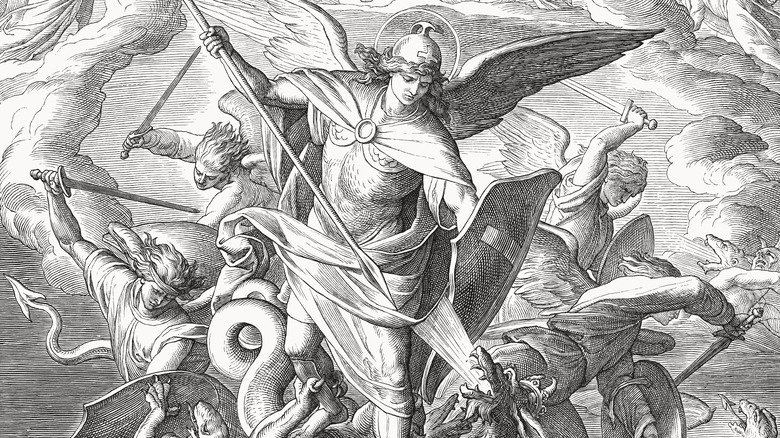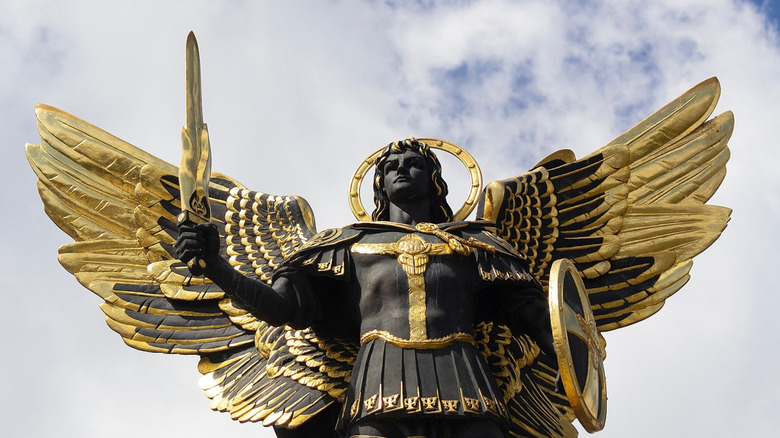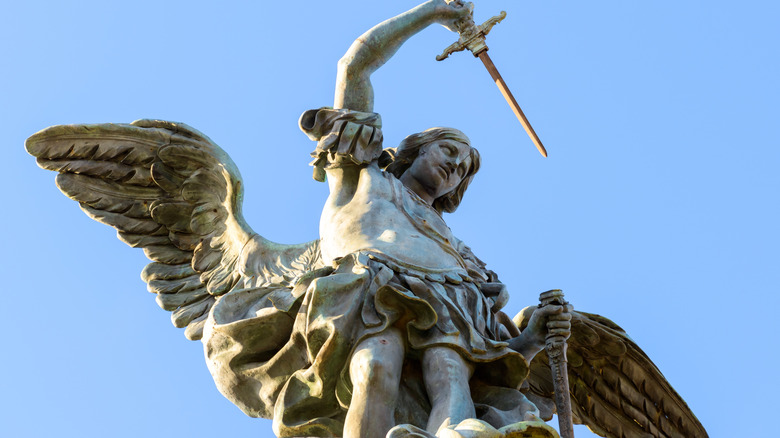Who Is The Most Powerful Angel, According To The Bible?
At this point, popular culture and historical artwork are replete with ideas and images of angels that are largely biblically inaccurate. Glowing messengers, winged humanoids, sword-wielding warriors: It's all a big jumble at this point. Is an angel an immortal entity composed of a spirit that is somehow physically powerful in a muscular way? Does an angel have magical powers like telekinesis or holy spells from God? Is it "powerful" in an aura kind of way, or in the way that a human political leader is "powerful"? These aren't merely facetious or pedantic questions. They illustrate the difficulty of even defining, let alone ranking, biblically angelic power in any sort of way that isn't riddled with logical or theological holes.
But, the Bible does step in to help clear this issue up — in an indirect way, at least. The Bible doesn't include a "Top 10 beastmode angel bros" list, but it does mention one "archaggelos," by the original Greek — chief angel — in the New Testament. In describing a scene from the Old Testament, the short letter of Jude describes the "archaggelo" (archangel in English) speaking with the devil about the body of Moses. The archangel's name should be familiar to many: Michael. His title places Michael at the top of the angelic heap because he's the only named archangel in the canonical Bible, either the Catholic or Protestant version. As for how he's "powerful," he's described as powerful because of his role rather than anything else. That role changes to suit circumstances over time and is described in a variety of vignettes across the Old and New Testaments.
Michael guards God's chosen people and confronts the devil
Because we don't exactly have a detailed spreadsheet defining the job roles of various angels vs. Michael, the archangel, we've got to look at what the canonical Bible describes him doing in order to understand why and how he's "powerful." And we say canonical Bible because non-canonical books mention seven archangels, total: Michael, Gabriel, Raphael, Uriel, Raguel (or Sealtiel), Zerachiel (or a lot of other names, including Saraqael), and Remiel (or names like Jeremiel). These other archangels show up in books like the Book of Enoch, but not in the officially sanctioned Bible.
Part messenger, part guardian, part creature of apparent free will, Michael is mentioned five times in the Bible: three times in the Old Testament book of Daniel, once in the New Testament book of Jude, and once in Revelation. Just by getting a name, he joins the ranks of only four biblical angels, including Lucifer, Gabriel, and Abaddon, which alludes to the uniqueness of role and power.
In Daniel 12, Michael is described as "the great prince who protects your [Daniel's] people." Earlier in Daniel 10, he appears to Daniel to tell him a vision of the future. In this book, Michael is referred to variously as a "prince," "one of the chief princes," and, "the great prince." Much later, Jude describes Michael making an independent decision to invoke the name of God to chastise the devil when discussing the fate of Moses' body. These verses aren't much to go on, and might not sound too impressive, but they still make Michael the most powerful biblical angel.
Michael's powerful role in Revelation
Without a doubt, Michael's biggest role comes in the Bible's final, apocalyptic book of Revelation, chapter 12. This chapter's vignette in is responsible for every single statue of Michael holding a sword across time. As the chapter's dreamlike, fantastical events unfold, there's a pregnant woman in the sky, "clothed with the sun," standing on the moon, and who has a "crown of twelve stars" on her head. There's also a dragon with seven heads, seven crowns, and ten horns who sweeps aside one-third of the stars and wants to devour the woman's newborn son. That son "will rule all the nations with an iron scepter." That's where Michael steps in.
The next bit of the story features the dragon and its angels facing off against Michael and Michael's angels in celestial combat. In what comes across as a colossal cosmic battle, Michael's forces defeated the dragon, aka, the devil, aka, Satan. The dragon and its angels are repelled out of the sky and back to Earth, and that's the last we hear of Michael.
We can argue all day about how Michael is imbued with God's power and therefore it's God who's powerful and not Michael, etc., etc. But either way we cut it, the passage in Revelation 12 places Michael's power on par with Satan's, including their respective angelic legions. This is a big jump up in power from earlier biblical roles, one that really can't be topped and which makes him, indisputably, the most powerful angel.


